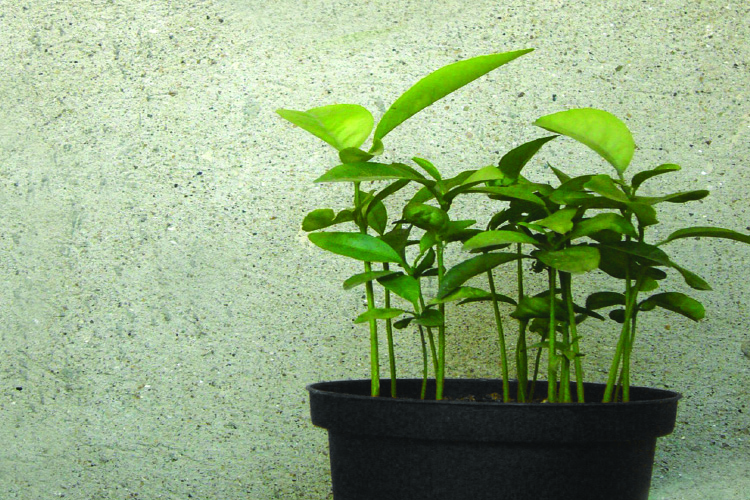Is the municipality’s anti-mosquito fumigation getting you down? Are you tired of applying jars of strange smelling, sticky mosquito repellents? Or do you, like me, love pottering in the garden and do not want to spend your time swatting mosquitoes?
I have a nursery in my own backyard, so I spend lots of time outdoors and would rather be tending my plants than swatting mosquitoes. If you always wanted a balcony garden, but the thought of these mini vampires kept you away, here are some plants that will beautify your green space and help control mosquitoes.
Table of Contents
Horsemint/Spearmint/Peppermint
Peppermint has long been used as a treatment for colds and flu. It has natural fungicidal and bacterial retardant properties because its essential oils are high in thymol. Peppermint is very easy to maintain and can also be planted under your larger plants as a beautiful ground cover to cover the soil.
Soil: Well drained soil
Sunlight: Partial to full sunlight (3-4 hours)
Water: 30-50 ml (for 6 inch pot), avoid water logging
Rosemary
This wonderful herb we use for seasoning is also a great, natural mosquito repellent. It has been used for centuries to keep pesky mosquitoes away.
Rosemary is a native of the Mediterranean, so it likes hot, dry weather and well-drained soil. It is an inexpensive and attractive way to boost the appearance of the landscape and have natural mosquito repellents on hand as well.
My quick rosemary mosquito-repellent recipe: Mix 4 drops of rosemary essential oil with ¼ cup olive oil. Store in a cool, dry place. Apply as needed.
Soil: Red, well drained soils, add coco peat or small loose stones to make the soil more permeable as plants
Sunlight: Partial to full sunlight (2-3 hours). If you live in a very hot tropical country like India where temperatures can reach 40 degrees C, then it’s best to keep in semi-shade conditions
Water: 30-50ml (6 inch pot), avoid water logging
Marigold
Organic gardeners have used marigolds as companion plants to keep aphids (plant lice) away. Mosquitoes don’t like its scent any better (and some humans feel the same way). Marigolds are sun-loving annuals that come in a variety of shapes and sizes for almost any landscape. They are quite easy to grow.
Soil: All types of soil.
Sunlight: Full sunlight (6-8 hours), strictly outdoors
Water: 50-80ml (6 inch pot)
Ageratum
This charming little bedding plant contains coumarin, and mosquitoes detest the smell. It is used in the perfume industry and is even in some commercial mosquito repellents. Don’t rub ageratum on your skin, though. It has some other less desirable elements that you do not want on your skin. Ageratums are annuals, and they come in a muted blue and white that complements most other plants in your garden.
Soil: Heavy loamy soils
Sunlight: Partial sunlight (Semi shade) to full sunlight conditions (4-5 hours) helps the plant flower more
Water: 50-80ml (6 inch pot), avoid waterlogging
Citronella
Citronella oil is popular as a ‘natural’ insect repellent. Its mosquito repellent qualities have been verified by research, including its effectiveness in repelling Aedes Aegypti (dengue fever mosquito). To be continually effective most citronella repellent formulas need to be reapplied to the skin every 30–60 minutes.
This plant has also been known to have superb anti fungal properties and is used in the perfumery industry for its high oil content.
Soil: Well drained soil
Sunlight: Full outdoor sunlight (At least 6 hours)
Water: 30-50 ml (for 6 inch pot), avoid water logging
Catnip
Catnip is one of the most powerful mosquito repellant plants. Recent studies have shown that it is ten times more effective than DEET at repelling mosquitoes. It is a short lived perennial and is easy to grow from seed, and quickly reseeds. Aside from its intoxicating effects on cats, the leaves make a very soothing tea.
Soil: Light, well drained soils
Sunlight: Plant is quite hardy, Can be kept both indoor/outdoor (6-8 hours)
Water: 30-80ml (6 inch pot)
How do I use these plants to repel mosquitoes?
With all of these plants, the leaves must be crushed to release the aroma. Otherwise mosquitoes cannot smell them. With rosemary and catnip, you can simply crush a few leaves and rub on your skin and clothing to enhance the effect.
What are other plant based solutions to repel mosquitoes
The other kind of mosquito plant is Agastache cana. Its common names include Texas hummingbird mint, bubblegum mint, giant hyssop, or giant hummingbird mint. As you might guess, hummingbirds are quite attracted to it.
Another slightly smelly but organic way to get rid of them is Garlic which is the main component in many herbal remedies. Mosquitoes hate it. Gardeners who eat lots of garlic may find that they scratch those mosquito bites far less. Of course, you would have to eat a lot of garlic and you may find that you repel more than just mosquitoes.
Nevertheless, organic gardeners use garlic sprays, powders and plants to help deter the creatures. It may not reduce their numbers dramatically, but when coupled with other natural combatants, you may see a reliable reduction.
So, next time you have an opportunity to plant, consider using some of these attractive plants to do more than just enhance the landscape.
















